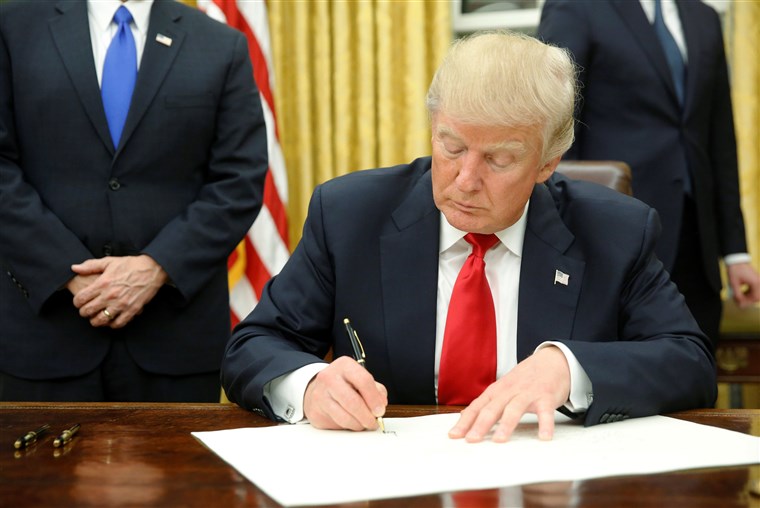President Donald Trump signed an executive order Wednesday authorizing sanctions against foreigners who meddle in U.S. elections, acting amid criticism that he has not taken election security seriously enough.
“We felt it was important to demonstrate the president has taken command of this issue, that it’s something he cares deeply about — that the integrity of our elections and our constitutional process are a high priority to him,” said national security adviser John Bolton.
The order calls for sanctioning any individual, company or country that interferes with campaign infrastructure or distributes disinformation and propaganda interfering with U.S. elections, Bolton told reporters.
It requires the national intelligence director to make regular assessments about foreign interference and asks the Homeland Security and Justice departments to submit reports on meddling in campaign-related infrastructure. It also lays out how the Treasury and State departments will recommend what sanctions to impose.
With the midterm elections now two months away, National Intelligence Director Dan Coats said the U.S. is not currently seeing the intensity of Russian intervention that was experienced in 2016, but he didn’t rule it out. He said the U.S. is also worried about the cyber activities of China, North Korea and Iran.
Coats said Trump’s order directs intelligence agencies to determine whether an individual, entity or country has interfered in a U.S. election and, if so, to turn the information over to the attorney general and Department of Homeland Security. He said the order also directs intelligence officials to conduct an assessment after elections to inform the public about what might have occurred.
“This clearly is a process put in place to try to assure that we are doing every possible thing we can, first of all, to prevent any interference with our elections, to report on anything we see between now and the election, but then to do a full assessment after the election to assure the American people just exactly what may have happened or may not have happened,” Coats said.
Sen. Marco Rubio, R-Fla., and Sen. Chris Van Hollen, D-Md., are pushing a bill that would prohibit foreign governments from purchasing election ads, using social media to spread false information or disrupting election infrastructure. They said Trump’s order recognizes the threat, but doesn’t go far enough.
The order gives the executive branch the discretion to impose sanctions for election meddling, but the bill would spell out sanctions on key economic sectors of a country that interferes. Those backing the legislation say that under the bill, a nation would know exactly what it would face if caught.
Virginia Sen. Mark Warner, ranking Democrat on the Senate intelligence committee, said the order leaves the president with broad discretion to decide whether to impose tough sanctions. “Unfortunately, President Trump demonstrated in Helsinki and elsewhere that he simply cannot be counted upon to stand up to (Russian President Vladimir) Putin when it matters,” said Warner, who is sponsoring the bill.
At a July 16 news conference with Putin in Helsinki, Trump was asked if he would denounce what happened in 2016 and warn Putin never to do it again. Trump did not directly answer the question. Instead, he delivered a rambling response, including demands for investigation of Hillary Clinton’s email server and his description of Putin’s “extremely strong and powerful” denial of meddling.
That drew outrage from both Republican and Democrats.
Trump has pushed back, saying that no other American president has been as tough on Russia. He has cited U.S. sanctions and the expulsion of alleged Russian spies from the U.S.
Mike Rogers, former director of the National Security Agency, said he thought Trump missed an opportunity in Helsinki to publicly scold Russia for meddling. Rogers said when he used to talk to Trump about the issue, Trump would often respond to him, saying “Mike, you know, I’m in a different place.”
Rogers said he would tell Trump: “Mr. President, I understand that, but I’m paid by the citizens of the nation to tell you what we think. Sir, this is not about politics, it’s not about parties. It’s about a foreign state that is attempting to subvert the very tenets of our structure.”
In his first public comments since he retired in June, Rogers said: “That should concern us as citizens. That should concern us leaders. And if we don’t do something, they (the Russians) are not going to stop.”
Rogers, who spoke Tuesday night at the Hayden Center at George Mason University in Virginia, also said earlier media reports claiming Trump had asked him to publicly deny any collusion between Moscow and Trump’s campaign were inaccurate.
James Clapper, the former national intelligence director who appeared with Rogers and other former intelligence officials, said he personally believes that the Russian interference did influence the outcome of the 2016 election, but didn’t elaborate.
“The Russians are still at it. They are committed to undermining our system,” Clapper said. “One of the things that really disturbs me is — that for whatever reason, I don’t know what it is — the president’s failure to dime out Putin and dime out the Russians for what they are doing.”
(AP)












4 Responses
What is he going to do about voter fraud and non-citizens voting?
Note that this is totally within the exclusive powers of the Congress, not the President (not that any presidents for the last few generations have been too concerned about usurping the Congress’s powers).
All the sudden he’s concerned???
The Russians can still donate to super pacs. Gosh Americans are so gullible and ignorant of how American govt works.